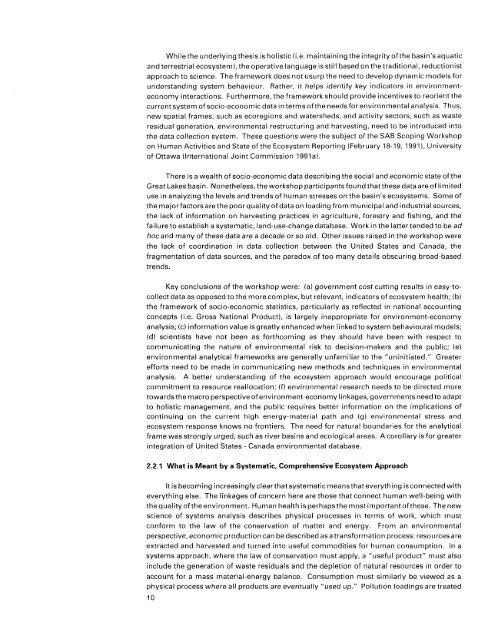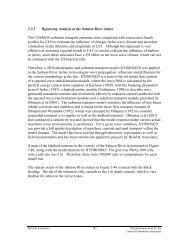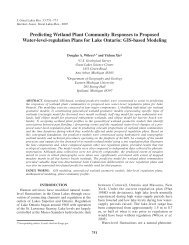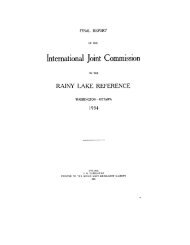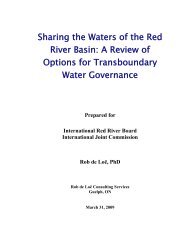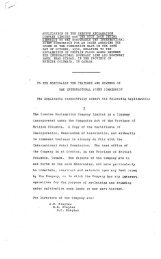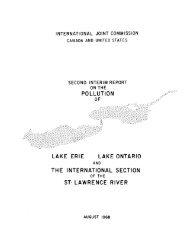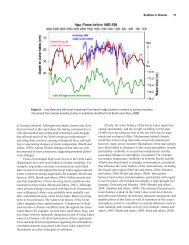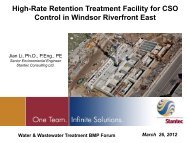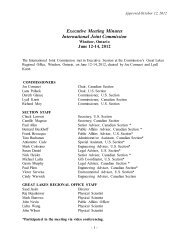International Joint Commission
International Joint Commission
International Joint Commission
You also want an ePaper? Increase the reach of your titles
YUMPU automatically turns print PDFs into web optimized ePapers that Google loves.
While the underlying thesis is holistic (i.e. maintaining the integrity ofthe basin's aquatic<br />
and terrestrial ecosystem), the operative language is still based on the traditional, reductionist<br />
approach to science. The framework does not usurp the need to develop dynamic models for<br />
understanding system behaviour. Rather, it helps identify key indicators in environmenteconomy<br />
interactions. Furthermore, the framework should provide incentives to reorient the<br />
current system of socio-economic data in terms of the needs for environmental analysis. Thus,<br />
new spatial frames, such as ecoregions and watersheds, and activity sectors, such as waste<br />
residual generation, environmental restructuring and harvesting, need to be introduced into<br />
the data collection system. These questions were the subject of the SAB Scoping Workshop<br />
on Human Activities and State of the Ecosystem Reporting (February 18-19, 1991), University<br />
of Ottawa (<strong>International</strong> <strong>Joint</strong> <strong>Commission</strong> 1991a).<br />
There is a wealth of socio-economic data describing the social and economic state ofthe<br />
Great Lakes basin. Nonetheless, the workshop participants found that these data are of limited<br />
use in analyzing the levels and trends of human stresses on the basin's ecosystems. Some of<br />
the major factors are the poor quality of data on loading from municipal and industrial sources,<br />
the lack of information on harvesting practices in agriculture, forestry and fishing, and the<br />
failure to establish a systematic, land-use-change database. Work in the latter tended to be ad<br />
hocand many of these data are a decade or so old. Other issues raised in the workshop were<br />
the lack of coordination in data collection between the United States and Canada, the<br />
fragmentation of data sources, and the paradox of too many details obscuring broad-based<br />
trends.<br />
Key conclusions of the workshop were: (a) government cost cutting results in easy-tocollect<br />
data as opposed to the more complex, but relevant, indicators of ecosystem health; (b)<br />
the framework of socio-economic statistics, particularly as reflected in national accounting<br />
concepts (i.e. Gross National Product), is largely inappropriate for environment-economy<br />
analysis; (c) information value is greatly enhanced when linked to system behavioural models;<br />
(d) scientists have not been as forthcoming as they should have been with respect to<br />
communicating the nature of environmental risk to decision-makers and the public; (e)<br />
e n v i r o n menta I a n a I yt i ca I f ra me wo r ks a re gene ra I I y u n f a m i I ia r to t h e " u n in it ia t ed . " G rea t e r<br />
efforts need to be made in communicating new methods and techniques in environmental<br />
analysis. A better understanding of the ecosystem approach would encourage political<br />
commitment to resource reallocation; (f) environmental research needs to be directed more<br />
towardsthe macro perspective of environment-economy linkages, governments need to adapt<br />
to holistic management, and the public requires better information on the implications of<br />
continuing on the current high energy-material path and (g) environmental stress and<br />
ecosystem response knows no frontiers. The need for natural boundaries for the analytical<br />
frame was strongly urged, such as river basins and ecological areas. A corollary is for greater<br />
integration of United States - Canada environmental database.<br />
2.2.1 What is Meant by a Systematic, Comprehensive Ecosystem Approach<br />
It is becoming increasinglyclearthat systematic means that everything is connected with<br />
everything else. The linkages of concern here are those that connect human well-being with<br />
the quality of the environment. Human health is perhaps the most important of these. The new<br />
science of systems analysis describes physical processes in terms of work, which must<br />
conform to the law of the conservation of matter and energy. From an environmental<br />
perspective, economic production can be described as a transformation process: resources are<br />
extracted and harvested and turned into useful commodities for human consumption. In a<br />
systems approach, where the law of conservation must apply, a "useful product" must also<br />
include the generation of waste residuals and the depletion of natural resources in order to<br />
account for a mass material-energy balance. Consumption must similarly be viewed as a<br />
physical process where all products are eventually "used up." Pollution loadings are treated<br />
10


